大学英语泛读教程2【第二版】UNIT1 课文翻译
- 格式:doc
- 大小:21.00 KB
- 文档页数:3
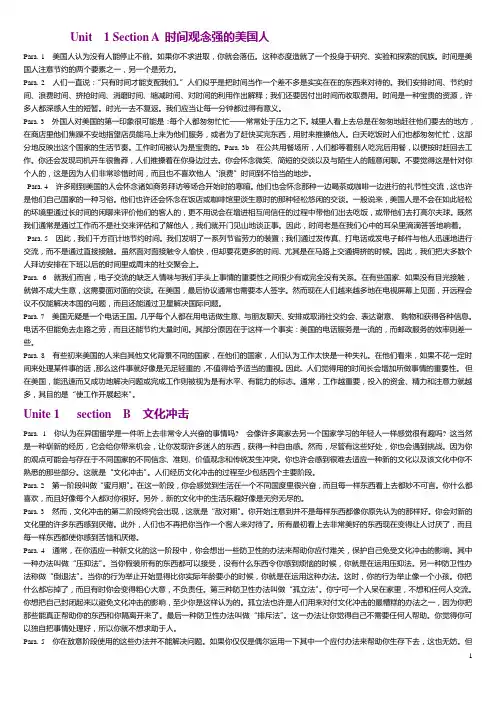
Unit 1 Section A 时间观念强的美国人Para. 1 美国人认为没有人能停止不前。
如果你不求进取,你就会落伍。
这种态度造就了一个投身于研究、实验和探索的民族。
时间是美国人注意节约的两个要素之一,另一个是劳力。
Para. 2 人们一直说:‚只有时间才能支配我们。
‛人们似乎是把时间当作一个差不多是实实在在的东西来对待的。
我们安排时间、节约时间、浪费时间、挤抢时间、消磨时间、缩减时间、对时间的利用作出解释;我们还要因付出时间而收取费用。
时间是一种宝贵的资源,许多人都深感人生的短暂。
时光一去不复返。
我们应当让每一分钟都过得有意义。
Para. 3 外国人对美国的第一印象很可能是:每个人都匆匆忙忙——常常处于压力之下。
城里人看上去总是在匆匆地赶往他们要去的地方,在商店里他们焦躁不安地指望店员能马上来为他们服务,或者为了赶快买完东西,用肘来推搡他人。
白天吃饭时人们也都匆匆忙忙,这部分地反映出这个国家的生活节奏。
工作时间被认为是宝贵的。
Para. 3b 在公共用餐场所,人们都等着别人吃完后用餐,以便按时赶回去工作。
你还会发现司机开车很鲁莽,人们推搡着在你身边过去。
你会怀念微笑、简短的交谈以及与陌生人的随意闲聊。
不要觉得这是针对你个人的,这是因为人们非常珍惜时间,而且也不喜欢他人‚浪费‛时间到不恰当的地步。
Para. 4 许多刚到美国的人会怀念诸如商务拜访等场合开始时的寒暄。
他们也会怀念那种一边喝茶或咖啡一边进行的礼节性交流,这也许是他们自己国家的一种习俗。
他们也许还会怀念在饭店或咖啡馆里谈生意时的那种轻松悠闲的交谈。
一般说来,美国人是不会在如此轻松的环境里通过长时间的闲聊来评价他们的客人的,更不用说会在增进相互间信任的过程中带他们出去吃饭,或带他们去打高尔夫球。
既然我们通常是通过工作而不是社交来评估和了解他人,我们就开门见山地谈正事。
因此,时间老是在我们心中的耳朵里滴滴答答地响着。
Para. 5 因此,我们千方百计地节约时间。
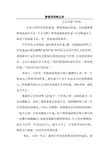
梦想的阴暗之面艾力克斯•哈利许多人怀有美好的愿望,期望能成为作家,但是能够梦想成真的人不多。
艾力克斯•哈利也想成为作家,可是他成功了。
阅读下面这篇文章,看一看他成功的原因。
许多青年人对我说,他们想成为作家。
我一直鼓励这样的人,但是我也向他们解释“成为作家”和写作之间存在着巨大的差别。
多数情况下这些年轻人梦寐以求的是财富与名誉,从未想到要孤身一人长久地坐在打字机旁。
“你们渴望的应该是写作,”我对他们说,“而不应该是当作家。
”事实上,写作是一项孤单寂寞而又收入微薄的工作。
有一个被命运之神垂青的作家,就有成千上万个永远无法实现梦想的人。
即使那些成功人士也经常受到长久的冷落,穷困不堪。
我便是其中之一。
我放弃了在海岸警卫队做了二十年的工作,为的是成为一名自由撰稿人,这时,我根本没有前途可言。
我所拥有的只是一位住在纽约市的朋友,乔治•西姆斯,他和我是在田纳西州的赫宁一起长大的。
乔治为我找了个家,位于格林威治村公寓大楼中的一间腾空的储藏室,而他是那幢大楼的管理员。
房子里冷嗖嗖的,没有卫生间,不过这没什么。
我马上买了一台旧的手动打字机,感觉自己颇象一位名符其实的作家。
然而,大约一年后,我的写作生涯依然没有任何起色,我开始怀疑自己。
卖出一篇小说是如此艰难,以至我几乎填不饱肚子。
但是,我清楚的是我想写作,我已梦寐以求了许多年。
我并不准备成为一名到死时还在想假如的人。
我会坚持把我的梦想付诸实践-- 即使这梦想意味着不稳定的生活和对失败的恐惧。
这是希望的阴暗面,任何心存梦想的人都必须学会在这阴暗面下生存。
后来有一天,我接到了一个电话,由此改变了我的一生。
这并不是一位代理人或编辑打来电话,主动要求与我签大的稿约。
恰恰相反-- 是一声鸣笛,诱使我放弃梦想。
打电话来的是海岸警卫队的老熟人,现在在旧金山。
他曾经借给我几美元,喜欢催我还给他。
“我什么时候才能拿到那十五美元,艾力克斯?”他逗我说。
“等我下一次卖出作品吧。
”“我有个好主意,”他说,“我们这儿需要一位新的公共信息管理员,年薪六千美元。
![[精选]大学英语泛读教程2【第二版】UNIT1 课文翻译资料](https://uimg.taocdn.com/607ae1fd51e79b8968022675.webp)
Dreams:making them work for usseveral nights a week Joseph woke up screaming from the same terrible dream.Joseph could never recall his whole dream,though.He only remembered that someone was running after him.Joseph was trying to get away,but in his dream he could not move。
he continued having this nightmare for months。
he was so tired in the morning that it was hard for him to go to work。
Joseph,you see,is not a frightened child,but a grown man。
Milton Kramer is a psychiatrist and dream researcher Cincinnati,Ohio.He believes that it is very important that people don't ignore their dreams,because they are messages from our sleeping minds.When Kramer studied dreams and dreamers,he found that people wake up feeling very discouraged after they have a bad dream.He also found that after having a good dream,people feel more optimistic.Clearly,dreams can have harmful or beneficial effects.As a result,Kramer believes that we need to learn how to change our bad dreams.When we understand what happened in our dreams,we can change negative,hurtful dreams to positive,helpful ones。
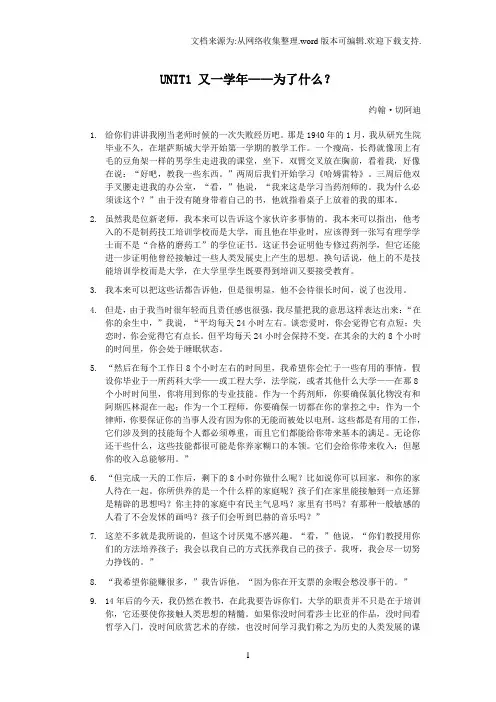
UNIT1 又一学年——为了什么?约翰·切阿迪1.给你们讲讲我刚当老师时候的一次失败经历吧。
那是1940年的1月,我从研究生院毕业不久,在堪萨斯城大学开始第一学期的教学工作。
一个瘦高,长得就像顶上有毛的豆角架一样的男学生走进我的课堂,坐下,双臂交叉放在胸前,看着我,好像在说:“好吧,教我一些东西。
”两周后我们开始学习《哈姆雷特》。
三周后他双手叉腰走进我的办公室,“看,”他说,“我来这是学习当药剂师的。
我为什么必须读这个?”由于没有随身带着自己的书,他就指着桌子上放着的我的那本。
2.虽然我是位新老师,我本来可以告诉这个家伙许多事情的。
我本来可以指出,他考入的不是制药技工培训学校而是大学,而且他在毕业时,应该得到一张写有理学学士而不是“合格的磨药工”的学位证书。
这证书会证明他专修过药剂学,但它还能进一步证明他曾经接触过一些人类发展史上产生的思想。
换句话说,他上的不是技能培训学校而是大学,在大学里学生既要得到培训又要接受教育。
3.我本来可以把这些话都告诉他,但是很明显,他不会待很长时间,说了也没用。
4.但是,由于我当时很年轻而且责任感也很强,我尽量把我的意思这样表达出来:“在你的余生中,”我说,“平均每天24小时左右。
谈恋爱时,你会觉得它有点短;失恋时,你会觉得它有点长。
但平均每天24小时会保持不变。
在其余的大约8个小时的时间里,你会处于睡眠状态。
5.“然后在每个工作日8个小时左右的时间里,我希望你会忙于一些有用的事情。
假设你毕业于一所药科大学——或工程大学,法学院,或者其他什么大学——在那8个小时时间里,你将用到你的专业技能。
作为一个药剂师,你要确保氯化物没有和阿斯匹林混在一起;作为一个工程师,你要确保一切都在你的掌控之中;作为一个律师,你要保证你的当事人没有因为你的无能而被处以电刑。
这些都是有用的工作,它们涉及到的技能每个人都必须尊重,而且它们都能给你带来基本的满足。
无论你还干些什么,这些技能都很可能是你养家糊口的本领。
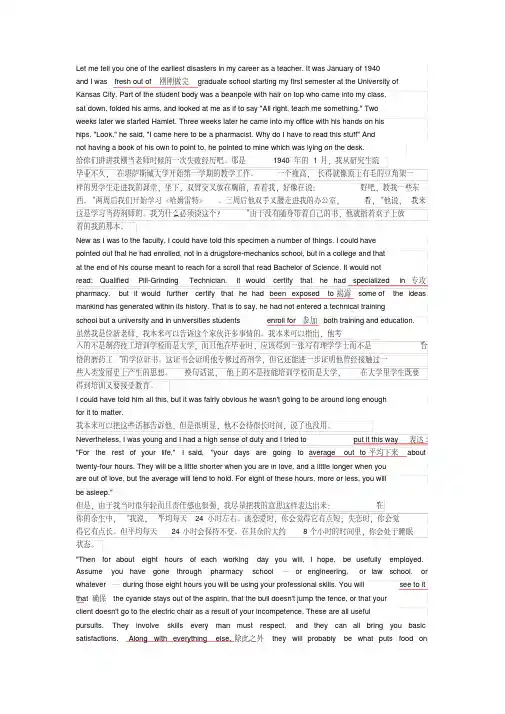
Let me tell you one of the earliest disasters in my career as a teacher. It was January of 1940and I was fresh out of刚刚做完graduate school starting my first semester at the University of Kansas City. Part of the student body was a beanpole with hair on top who came into my class,sat down, folded his arms, and looked at me as if to say "All right, teach me something." Twoweeks later we started Hamlet. Three weeks later he came into my office with his hands on hiships. "Look," he said, "I came here to be a pharmacist. Why do I have to read this stuff" Andnot having a book of his own to point to, he pointed to mine which was lying on the desk.给你们讲讲我刚当老师时候的一次失败经历吧。
那是1940年的1月,我从研究生院毕业不久,在堪萨斯城大学开始第一学期的教学工作。
一个瘦高,长得就像顶上有毛的豆角架一样的男学生走进我的课堂,坐下,双臂交叉放在胸前,看着我,好像在说:“好吧,教我一些东西。
”两周后我们开始学习《哈姆雷特》。
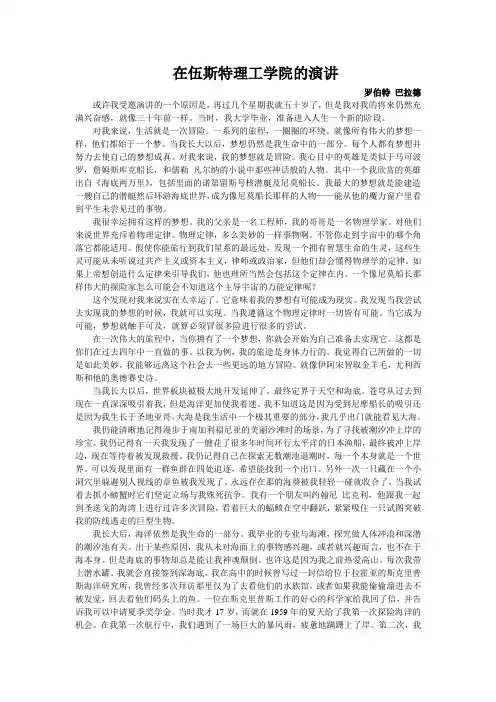
在伍斯特理工学院的演讲罗伯特巴拉德或许我受邀演讲的一个原因是,再过几个星期我就五十岁了,但是我对我的将来仍然充满兴奋感,就像三十年前一样。
当时,我大学毕业,准备进入人生一个新的阶段。
对我来说,生活就是一次冒险。
一系列的旅程,一圈圈的环绕。
就像所有伟大的梦想一样,他们都始于一个梦。
当我长大以后,梦想仍然是我生命中的一部分。
每个人都有梦想并努力去使自己的梦想成真。
对我来说,我的梦想就是冒险。
我心目中的英雄是类似于马可波罗,詹姆斯库克船长,和儒勒凡尔纳的小说中那些神话般的人物。
其中一个我欣赏的英雄出自《海底两万里》,包括里面的诺第留斯号核潜艇及尼莫船长。
我最大的梦想就是能建造一艘自己的潜艇然后环游海底世界,成为像尼莫船长那样的人物——能从他的魔力窗户里看到平生未尝见过的事物。
我很幸运拥有这样的梦想。
我的父亲是一名工程师,我的哥哥是一名物理学家。
对他们来说世界充斥着物理定律。
物理定律,多么美妙的一样事物啊。
不管你走到宇宙中的哪个角落它都能适用。
假使你能旅行到我们星系的最远处,发现一个拥有智慧生命的生灵,这些生灵可能从未听说过共产主义或资本主义,律师或政治家,但他们却会懂得物理学的定律。
如果上帝想创造什么定律来引导我们,他也理所当然会包括这个定律在内。
一个像尼莫船长那样伟大的探险家怎么可能会不知道这个主导宇宙的万能定律呢?这个发现对我来说实在太幸运了。
它意味着我的梦想有可能成为现实。
我发现当我尝试去实现我的梦想的时候,我就可以实现。
当我遵循这个物理定律时一切皆有可能。
当它成为可能,梦想就触手可及,就算必须冒很多险进行很多的尝试。
在一次伟大的旅程中,当你拥有了一个梦想,你就会开始为自己准备去实现它。
这都是你们在过去四年中一直做的事。
以我为例,我的旅途是身体力行的。
我觉得自己所做的一切是如此美妙。
我能够远离这个社会去一些更远的地方冒险。
就像伊阿宋智取金羊毛,尤利西斯和他的奥德赛史诗。
当我长大以后,世界板块被极大地开发延伸了,最终定界于天空和海底。
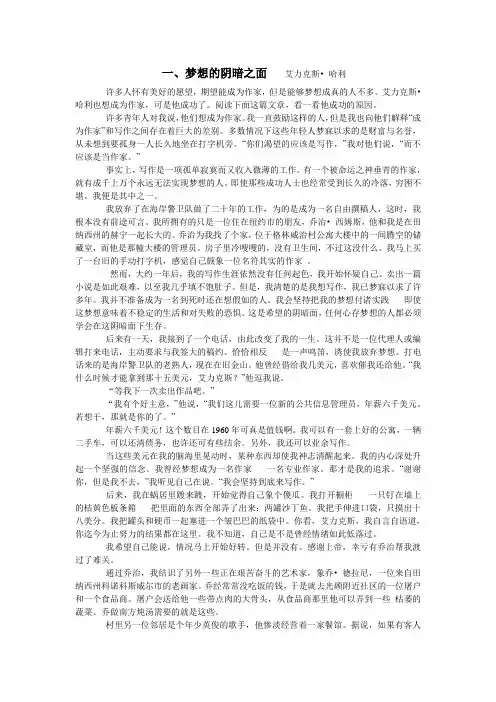
一、梦想的阴暗之面艾力克斯•哈利许多人怀有美好的愿望,期望能成为作家,但是能够梦想成真的人不多。
艾力克斯•哈利也想成为作家,可是他成功了。
阅读下面这篇文章,看一看他成功的原因。
许多青年人对我说,他们想成为作家。
我一直鼓励这样的人,但是我也向他们解释“成为作家”和写作之间存在着巨大的差别。
多数情况下这些年轻人梦寐以求的是财富与名誉,从未想到要孤身一人长久地坐在打字机旁。
“你们渴望的应该是写作,”我对他们说,“而不应该是当作家。
”事实上,写作是一项孤单寂寞而又收入微薄的工作。
有一个被命运之神垂青的作家,就有成千上万个永远无法实现梦想的人。
即使那些成功人士也经常受到长久的冷落,穷困不堪。
我便是其中之一。
我放弃了在海岸警卫队做了二十年的工作,为的是成为一名自由撰稿人,这时,我根本没有前途可言。
我所拥有的只是一位住在纽约市的朋友,乔治•西姆斯,他和我是在田纳西州的赫宁一起长大的。
乔治为我找了个家,位于格林威治村公寓大楼中的一间腾空的储藏室,而他是那幢大楼的管理员。
房子里冷嗖嗖的,没有卫生间,不过这没什么。
我马上买了一台旧的手动打字机,感觉自己颇象一位名符其实的作家。
然而,大约一年后,我的写作生涯依然没有任何起色,我开始怀疑自己。
卖出一篇小说是如此艰难,以至我几乎填不饱肚子。
但是,我清楚的是我想写作,我已梦寐以求了许多年。
我并不准备成为一名到死时还在想假如的人。
我会坚持把我的梦想付诸实践-- 即使这梦想意味着不稳定的生活和对失败的恐惧。
这是希望的阴暗面,任何心存梦想的人都必须学会在这阴暗面下生存。
后来有一天,我接到了一个电话,由此改变了我的一生。
这并不是一位代理人或编辑打来电话,主动要求与我签大的稿约。
恰恰相反-- 是一声鸣笛,诱使我放弃梦想。
打电话来的是海岸警卫队的老熟人,现在在旧金山。
他曾经借给我几美元,喜欢催我还给他。
“我什么时候才能拿到那十五美元,艾力克斯?”他逗我说。
“等我下一次卖出作品吧。
”“我有个好主意,”他说,“我们这儿需要一位新的公共信息管理员,年薪六千美元。
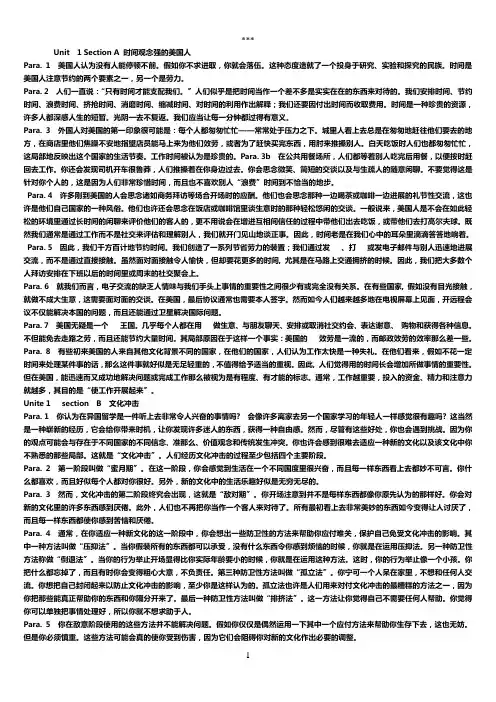
Unit 1 Section A 时间观念强的美国人Para. 1 美国人认为没有人能停顿不前。
假如你不求进取,你就会落伍。
这种态度造就了一个投身于研究、实验和探究的民族。
时间是美国人注意节约的两个要素之一,另一个是劳力。
Para. 2 人们一直说:“只有时间才能支配我们。
〞人们似乎是把时间当作一个差不多是实实在在的东西来对待的。
我们安排时间、节约时间、浪费时间、挤抢时间、消磨时间、缩减时间、对时间的利用作出解释;我们还要因付出时间而收取费用。
时间是一种珍贵的资源,许多人都深感人生的短暂。
光阴一去不复返。
我们应当让每一分钟都过得有意义。
Para. 3 外国人对美国的第一印象很可能是:每个人都匆匆忙忙——常常处于压力之下。
城里人看上去总是在匆匆地赶往他们要去的地方,在商店里他们焦躁不安地指望店员能马上来为他们效劳,或者为了赶快买完东西,用肘来推搡别人。
白天吃饭时人们也都匆匆忙忙,这局部地反映出这个国家的生活节奏。
工作时间被认为是珍贵的。
Para. 3b 在公共用餐场所,人们都等着别人吃完后用餐,以便按时赶回去工作。
你还会发现司机开车很鲁莽,人们推搡着在你身边过去。
你会思念微笑、简短的交谈以及与生疏人的随意闲聊。
不要觉得这是针对你个人的,这是因为人们非常珍惜时间,而且也不喜欢别人“浪费〞时间到不恰当的地步。
Para. 4 许多刚到美国的人会思念诸如商务拜访等场合开场时的应酬。
他们也会思念那种一边喝茶或咖啡一边进展的礼节性交流,这也许是他们自己国家的一种风俗。
他们也许还会思念在饭店或咖啡馆里谈生意时的那种轻松悠闲的交谈。
一般说来,美国人是不会在如此轻松的环境里通过长时间的闲聊来评价他们的客人的,更不用说会在增进互相间信任的过程中带他们出去吃饭,或带他们去打高尔夫球。
既然我们通常是通过工作而不是社交来评估和理解别人,我们就开门见山地谈正事。
因此,时间老是在我们心中的耳朵里滴滴答答地响着。
Para. 5 因此,我们千方百计地节约时间。
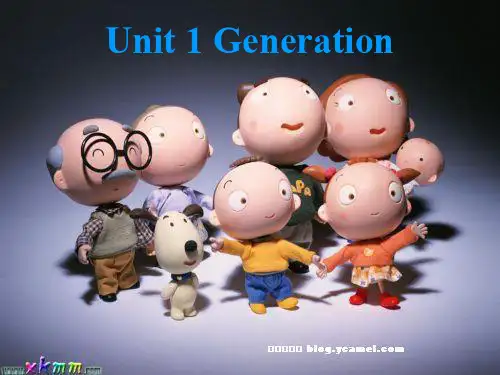
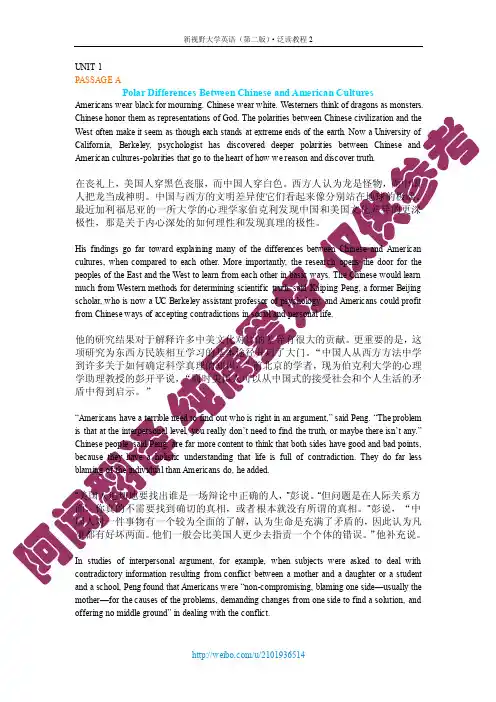
UNIT 1PASSAGE APolar Differences Between Chinese and American CulturesAmericans wear black for mourning. Chinese wear white. Westerners think of dragons as monsters. Chinese honor them as representations of God. The polarities between Chinese civilization and the West often make it seem as though each stands at extreme ends of the earth. Now a University of California, Berkeley, psychologist has discovered deeper polarities between Chinese and American cultures-polarities that go to the heart of how we reason and discover truth.在丧礼上,美国人穿黑色丧服,而中国人穿白色。
西方人认为龙是怪物,而中国人把龙当成神明。
中国与西方的文明差异使它们看起来像分别站在地球的极端。
最近加利福尼亚的一所大学的心理学家伯克利发现中国和美国文化差异的更深极性,那是关于内心深处的如何理性和发现真理的极性。
His findings go far toward explaining many of the differences between Chinese and American cultures, when compared to each other. More importantly, the research opens the door for the peoples of the East and the West to learn from each other in basic ways. The Chinese would learn much from Western methods for determining scientific truth, said Kaiping Peng, a former Beijing scholar, who is now a UC Berkeley assistant professor of psychology, and Americans could profit from Chinese ways of accepting contradictions in social and personal life.他的研究结果对于解释许多中美文化对比的差异有很大的贡献。
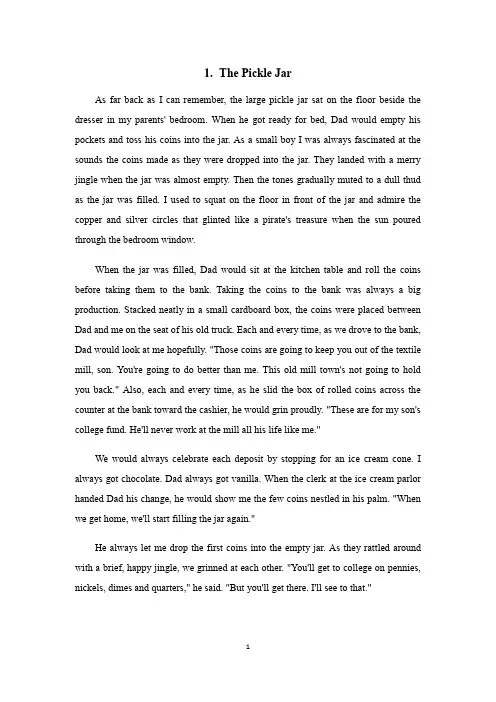
1.The Pickle JarAs far back as I can remember, the large pickle jar sat on the floor beside the dresser in my parents' bedroom. When he got ready for bed, Dad would empty his pockets and toss his coins into the jar. As a small boy I was always fascinated at the sounds the coins made as they were dropped into the jar. They landed with a merry jingle when the jar was almost empty. Then the tones gradually muted to a dull thud as the jar was filled. I used to squat on the floor in front of the jar and admire the copper and silver circles that glinted like a pirate's treasure when the sun poured through the bedroom window.When the jar was filled, Dad would sit at the kitchen table and roll the coins before taking them to the bank. Taking the coins to the bank was always a big production. Stacked neatly in a small cardboard box, the coins were placed between Dad and me on the seat of his old truck. Each and every time, as we drove to the bank, Dad would look at me hopefully. "Those coins are going to keep you out of the textile mill, son. You're going to do better than me. This old mill town's not going to hold you back." Also, each and every time, as he slid the box of rolled coins across the counter at the bank toward the cashier, he would grin proudly. "These are for my son's college fund. He'll never work at the mill all his life like me."We would always celebrate each deposit by stopping for an ice cream cone. I always got chocolate. Dad always got vanilla. When the clerk at the ice cream parlor handed Dad his change, he would show me the few coins nestled in his palm. "When we get home, we'll start filling the jar again."He always let me drop the first coins into the empty jar. As they rattled around with a brief, happy jingle, we grinned at each other. "You'll get to college on pennies, nickels, dimes and quarters," he said. "But you'll get there. I'll see to that."The years passed, and I finished college and took a job in another town. Once, while visiting my parents, I used the phone in their bedroom, and noticed that the pickle jar was gone. It had served its purpose and had been removed. A lump rose in my throat as I stared at the spot beside the dresser where the jar had always stood. My dad was a man of few words, and never lectured me on the values of determination, perseverance, and faith. The pickle jar had taught me all these virtues far more eloquently than the most flowery of words could have done.When I married, I told my wife Susan about the significant part the lowly pickle jar had played in my life as a boy. In my mind, it defined, more than anything else, how much my dad had loved me. No matter how rough things got at home, Dad continued to doggedly drop his coins into the jar. Even the summer when Dad got laid off from the mill, and Mama had to serve dried beans several times a week, not a single dime was taken from the jar. To the contrary, as Dad looked across the table at me, pouring catsup over my beans to make them more palatable, he became more determined than ever to make a way out for me. "When you finish college, son," he told me, his eyes glistening, "You’ll never have to eat beans again unless you want to." The first Christmas after our daughter Jessica was born, we spent the holiday with my parents. After dinner, Mom and Dad sat next to each other on the sofa, taking turns cuddling their first grandchild. Jessica began to whimper softly, and Susan took her from Dad's arms. "She probably needs to be changed," she said, carrying the baby into my parents' bedroom to diaper her.When Susan came back into the living room, there was a strange mist in her eyes. She handed Jessica back to Dad before taking my hand and quietly leading me into the room."Look," she said softly, her eyes directing me to a spot on the floor beside the dresser. To my amazement, there, as if it had never been removed, stood the old pickle jar, the bottom already covered with coins.I walked over to the pickle jar, dug down into my pocket, and pulled out a fistful of coins. With a gamut of emotions choking me, I dropped the coins into the jar. I looked up and saw that Dad, carrying Jessica, had slipped quietly into the room. Our eyes locked, and I knew he was feeling the same emotions I felt. Neither one of us could speak.Exercises1. Read the following statements and decide whether they are true (T) or false (F) according to the text.1.The sounds which the coins made as they were dropped into the pickle jar greatlyinterested the narrator. ( )2.Before taking them to the bank, the father would ask his son to count the coins.( )3.The Father was a bit ashamed each time he slid the box of rolled coins across thecounter at the bank. ( )4.After each deposit, the narrator would ask his father to buy him a vanilla icecream cone. ( )5.After graduation from college, the narrator worked in another town. ( )6.The narrator felt that he had learned the values of determination, perseverance andfaith from the pickle jar. ( )7.From what his father did, the narrator could feel his great love for him. ( )8.The narrator and his wife spent the first Christmas after their marriage with hisparents. ( )9.Puzzled by what she saw, the narrator’s wife led him into his parents’ bedroom.( )10.The narrator dropped a fistful of coins into the jar in return for his father’s love forhim. ( )2.Choose the best answer to each of the following questions based on theinformation of the text.1.When the narrator was young, ___________.A)he used to toss all the coins he had into a pickle jarB)he used to like making sounds by dropping coins into a pickle jarC)his father used to save all the coins he hadD)his father used to give him all the coins he had2.By depositing the coins in the bank, the father was determined that ______.A)he would teach his son the virtue of thriftB)he would leave as much money as possible to his sonC)his family would be better off in the futureD)his son would go to college and live a better life3.The narrator felt ______ as he stared at the place where the jar had always stood.A)strangeB)puzzledC)movedD)embarrassed4.It can be inferred from the passage that when the narrator was young, _____.A)his family was very poorB)his father was more determined than his motherC)his mother liked to serve dried beans for the familyD)he did very well in his studies5.The narrator was amazed and moved to find that ________.A)the old pickle jar had never been removedB)his father had never stopped depositing moneyC)the old pickle jar was filled with coinsD)his father had started to save money for his baby daughter咸菜坛子在我的记忆中,那个大泡菜坛子就放在父母卧室梳妆台旁边的地板上。
Unit 1Active reading (1)大学已经不再特别了1 有这么一种说法:“要是你能记得20 世纪60 年代的任何事情,你就没有真正经历过那段岁月。
”对于在大麻烟雾中度过大学时光的那些人,这话可能是真的。
但是,20 世纪60 年代有一件事人人都记得,那就是:上大学是你一生中最激动人心、最刺激的经历。
20 世纪60 年代,加州的高校把本州变成了世界第七大经济实体。
然而,加州大学的主校园伯克利分校也以学生示威、罢课以及激进的政治氛围而著名。
1966 年,罗纳德·里根竞选加州州长,他问加州是否允许“一所伟大的大学被喧闹的、持不一意见的少数人征服。
”自由派人士回答说,大学之所以伟大正是因为它们有能力容忍喧闹的、持不同意见的少数人。
3 在欧洲的大学校园里,大学生以新的姿态和激情地投入到自由和正义的事业中去,大规模的社会主义或共产主义运动引发了他们与当权者之间日益升级的暴力冲突。
许多抗议是针对越南战争的。
可是在法国,巴黎大学的学生与工会联盟,发动了一场大罢工,最终导致了戴高乐总统辞职。
4 20 世纪60 年代大学生活的特点并不仅仅是激进的行动。
不论在什么地方,上大学都意味着你初次品尝真正自由的滋味,初次品尝深更半夜在宿舍或学生活动室里讨论人生意义的滋味。
你往往得上了大学才得以阅读你的第一本禁书,看你的第一部独立影人电影,或者找到和你一样痴迷吉米·亨德里克斯或伦尼·布鲁斯的志同道合者。
那是一段难以想象的自由时光,你一生中最无拘无束的时光。
5 可如今那份激情哪儿去了?大学怎么了?现在,政治、社会和创造意识的觉醒似乎不是凭借大学的助力,而是冲破其阻力才发生的。
当然,一点不假,高等教育仍然重要。
例如,在英国,布莱尔首相几乎实现了到2010 年让50%的30 岁以下的人上大学的目标,(即使愤世嫉俗的人会说,这是要把他们排除在失业统计数据之外)。
不过,大学教育已不再是全民重视的话题了。
Unit 1 Section A 时间观念强的美国人Para. 1 美国人认为没有人能停止不前。
如果你不求进取,你就会落伍。
这种态度造就了一个投身于研究、实验和探索的民族。
时间是美国人注意节约的两个要素之一,另一个是劳力。
Para. 2 人们一直说:“只有时间才能支配我们。
”人们似乎是把时间当作一个差不多是实实在在的东西来对待的。
我们安排时间、节约时间、浪费时间、挤抢时间、消磨时间、缩减时间、对时间的利用作出解释;我们还要因付出时间而收取费用。
时间是一种宝贵的资源,许多人都深感人生的短暂。
时光一去不复返。
我们应当让每一分钟都过得有意义。
Para. 3 外国人对美国的第一印象很可能是:每个人都匆匆忙忙——常常处于压力之下。
城里人看上去总是在匆匆地赶往他们要去的地方,在商店里他们焦躁不安地指望店员能马上来为他们服务,或者为了赶快买完东西,用肘来推搡他人。
白天吃饭时人们也都匆匆忙忙,这部分地反映出这个国家的生活节奏。
工作时间被认为是宝贵的。
Para. 3b 在公共用餐场所,人们都等着别人吃完后用餐,以便按时赶回去工作。
你还会发现司机开车很鲁莽,人们推搡着在你身边过去。
你会怀念微笑、简短的交谈以及与陌生人的随意闲聊。
不要觉得这是针对你个人的,这是因为人们非常珍惜时间,而且也不喜欢他人“浪费”时间到不恰当的地步。
Para. 4Para. 5Para. 6Para. 7差一些。
Para. 8Unit2Para. 1Para. 2Para. 3Para. 4手。
Para. 5 的确,后来我经历了无数痛苦的训练,还为此流了不少眼泪。
但在后来的五年里,我总能从尼克莱讲的有趣故事和他的幽默感中得到鼓励。
Para. 6 他开始总是说:“我的朋友们常去看电影,去跳舞,去和女孩子约会,”然后他会降低声音接着说:“我就在运动场上训练、训练、再训练。
第二年,我的15公里滑雪比赛成绩缩短了1.5分钟。
”Para. 7 “朋友们问我:‘尼克莱,你怎么做到的呢?’我回答:‘你们去看电影、跳舞、和女孩子约会,而我一直在训练、训练、再训练。
Dreams:making them work for usseveral nights a week Joseph woke up screaming from the same terrible dream.Joseph could never recall his whole dream,though.He only remembered that someone was running after him.Joseph was trying to get away,but in his dream he could not move。
he continued having this nightmare for months。
he was so tired in the morning that it was hard for him to go to work。
Joseph,you see,is not a frightened child,but a grown man。
Milton Kramer is a psychiatrist and dream researcher Cincinnati,Ohio.He believes that it is very important that people don't ignore their dreams,because they are messages from our sleeping minds.When Kramer studied dreams and dreamers,he found that people wake up feeling very discouraged after they have a bad dream.He also found that after having a good dream,people feel more optimistic.Clearly,dreams can have harmful or beneficial effects.As a result,Kramer believes that we need to learn how to change our bad dreams.When we understand what happened in our dreams,we can change negative,hurtful dreams to positive,helpful ones。
泛读教程2第二版课文翻译1. 介绍:泛读教程2第二版是一本针对中级英语学习者的教材,旨在提高学生的泛读技能。
本教程共分为多个单元,每个单元都包含一篇主题相关的课文。
以下是课文的翻译:2. 课文1:旅行的乐趣许多人都喜欢旅行。
旅行能让我们逃离日常生活的压力,去探索新的地方和体验不同的文化。
然而,旅行也可以是一次充满冒险和挑战的经历。
无论是国内还是国际旅行,我们都可以从中学到许多东西,并且开阔自己的眼界。
3. 课文2:健康的生活方式保持健康的生活方式对我们的身心健康至关重要。
均衡的饮食,定期的运动以及良好的睡眠都是保持健康的关键。
此外,养成良好的习惯,例如不吸烟和减少酒精摄入也非常重要。
通过培养健康的生活习惯,我们能够提高生活质量,并预防许多常见疾病。
4. 课文3:文化多样性文化多样性是世界上一个非常重要的特征。
每个国家都有独特的文化传统,包括语言、风俗和传统节日等。
通过了解和尊重其他文化,我们可以增强不同民族之间的理解和友谊。
同时,文化多样性也促进了艺术、音乐和文学等方面的创新和交流。
5. 课文4:科技在日常生活中的应用科技的快速发展对我们的日常生活产生了巨大的影响。
我们可以通过电子邮件、社交媒体和视频通话等方式与他人保持联系。
此外,科技还为我们提供了更多的娱乐选择,例如电子书、在线游戏和电影流媒体等。
然而,我们也要注意科技对我们的生活方式、人际关系和隐私的潜在影响。
6. 课文5:环境保护的重要性环境保护是一个全球性的问题。
我们的地球面临着气候变化、水污染和生物多样性丧失等挑战。
为了保护我们的环境,每个人都应该采取行动。
这可以包括节约能源、减少垃圾、鼓励可持续发展和参与环境保护组织等。
通过保护环境,我们可以为未来的世代创造一个更美好的世界。
请注意,以上课文的翻译仅供参考,可能存在个别词语或句子的表达不完全准确的情况。
Unit 1 Section A 时间观念强的美国人Para. 1 美国人认为没有人能停止不前。
如果你不求进取,你就会落伍。
这种态度造就了一个投身于研究、实验和探索的民族。
时间是美国人注意节约的两个要素之一,另一个是劳力。
Para. 2 人们一直说:“只有时间才能支配我们。
”人们似乎是把时间当作一个差不多是实实在在的东西来对待的。
我们安排时间、节约时间、浪费时间、挤抢时间、消磨时间、缩减时间、对时间的利用作出解释;我们还要因付出时间而收取费用。
时间是一种宝贵的资源,许多人都深感人生的短暂。
时光一去不复返。
我们应当让每一分钟都过得有意义。
Para. 3 外国人对美国的第一印象很可能是:每个人都匆匆忙忙——常常处于压力之下。
城里人看上去总是在匆匆地赶往他们要去的地方,在商店里他们焦躁不安地指望店员能马上来为他们服务,或者为了赶快买完东西,用肘来推搡他人。
白天吃饭时人们也都匆匆忙忙,这部分地反映出这个国家的生活节奏。
工作时间被认为是宝贵的。
Para. 3b 在公共用餐场所,人们都等着别人吃完后用餐,以便按时赶回去工作。
你还会发现司机开车很鲁莽,人们推搡着在你身边过去。
你会怀念微笑、简短的交谈以及与陌生人的随意闲聊。
不要觉得这是针对你个人的,这是因为人们非常珍惜时间,而且也不喜欢他人“浪费”时间到不恰当的地步。
Para. 4 许多刚到美国的人会怀念诸如商务拜访等场合开始时的寒暄。
他们也会怀念那种一边喝茶或咖啡一边进行的礼节性交流,这也许是他们自己国家的一种习俗。
他们也许还会怀念在饭店或咖啡馆里谈生意时的那种轻松悠闲的交谈。
一般说来,美国人是不会在如此轻松的环境里通过长时间的闲聊来评价他们的客人的,更不用说会在增进相互间信任的过程中带他们出去吃饭,或带他们去打高尔夫球。
既然我们通常是通过工作而不是社交来评估和了解他人,我们就开门见山地谈正事。
因此,时间老是在我们心中的耳朵里滴滴答答地响着。
Para. 5 因此,我们千方百计地节约时间。
Unit1美国人认为没有人能停止不前。
如果你不求进取,你就会落伍。
这种态度造就了一个投身于研究、实验和探索的民族。
时间是美国人注意节约的两个要素之一,另一要素是劳力。
人们一直说:“只有时间才能支配我们。
”人们似乎把时间当作一个差不多是实实在在的东西来对待。
我们安排时间、节约时间、浪费时间、挤抢时间、消磨时间、缩减时间、对时间的利用作出解释;我们还要因付出时间而收取费用。
时间是一种宝贵的资源,许多人都深感人生的短暂。
时光一去不复返。
我们应当让每一分钟都过得有意义。
外国人对美国的第一印象很可能是:每个人都匆匆忙忙──常常处于压力之下。
城里人看上去总是在匆匆地赶往他们要去的地方,在商店里他们焦躁不安地指望店员能马上来为他们服务,或者为了赶快买完东西,用肘来推搡他人。
白天吃饭时人们也都匆匆忙忙,这部分地反映出这个国家的生活节奏。
人们认为工作时间是宝贵的。
在公共用餐场所,人们都等着别人尽快吃完,以便他们也能及时用餐,你还会发现司机开车很鲁莽,人们推搡着在你身边过去。
你会怀念微笑、简短的交谈以及与陌生人的随意闲聊。
不要觉得这是针对你个人的,这是因为人们都非常珍惜时间,而且也不喜欢他人“浪费”时间到不恰当的地步。
许多刚到美国的人会怀念诸如商务拜访等场合开始时的寒暄。
他们也会怀念那种一边喝茶或喝咖啡一边进行的礼节性交流,这也许是他们自己国家的一种习俗。
他们也许还会怀念在饭店或咖啡馆里谈生意时的那种轻松悠闲的交谈。
一般说来,美国人是不会在如此轻松的环境里通过长时间的闲聊来评价他们的客人的,更不用说会在增进相互间信任的过程中带他们出去吃饭,或带他们去打高尔夫球。
既然我们通常是通过工作而不是社交来评估和了解他人,我们就开门见山地谈正事。
因此,时间老是在我们心中滴滴答答地响着。
因此,我们千方百计地节约时间。
我们发明了一系列节省劳力的装置;我们通过发传真、打电话或发电子邮件与他人迅速地进行交流,而不是通过直接接触。
虽然面对面接触令人愉快,但却要花更多的时间,尤其是在马路上交通拥挤的时候。
Dreams:making them work for us
several nights a week Joseph woke up screaming from the same terrible dream.Joseph could never recall his whole dream,though.He only remembered that someone was running after him.Joseph was trying to get away,but in his dream he could not move。
he continued having this nightmare for months。
he was so tired in the morning that it was hard for him to go to work。
Joseph,you see,is not a frightened child,but a grown man。
Milton Kramer is a psychiatrist and dream researcher Cincinnati,Ohio.He believes that it is very important that people don't ignore their dreams,because they are messages from our sleeping minds.When Kramer studied dreams and dreamers,he found that people wake up feeling very discouraged after they have a bad dream.He also found that after having a good dream,people feel more optimistic.Clearly,dreams can have harmful or beneficial effects.As a result,Kramer believes that we need to learn how to change our bad dreams.When we understand what happened in our dreams,we can change negative,hurtful dreams to positive,helpful ones。
Before we can begin to change a nightmare,however,we first have to remember what happened in our dream.Researchers say there are many ways to do this.We can keep a journal or diary of what we do when we are awake. Then,before going to sleep,we can review our day.This practice helps us to stay in charge.When we wake up,we should lie still while we try to remember our dream.Dream researchers say that by staying in the same sleeping positive,we are more likely to recall the dream.We should also try to remember an important word or picture from the dream.This image makes the rest of the dream easier to later.The longer we sleep,the longer and more complex our dreams will be.
Dr.Rosalind Cartwright is a dream researcher,too.She has developed another dream therapy for changing dreams.According to Dr.Cartwright,dream therapy involves four simple steps you can learn on your own.The first step is to recognize when you are having a bad dream that will make you feel helpless or upset the next morning.The second
step is to identify what it is about the dream that makes you feel bad-for example,weak instead of strong,or out of control instead of in control. Next,stop any bad dream.You do not have to continue your bad dream,because you are in charge.The last step is to change the negative part of the dream.Sometimes you may have to wake yourself up and change the dream before you return to sleep.Other times it is possible to change the dream while you are still asleep.
By using dream therapy,Joseph was able to change his nightmares.Gradually,his bad dreams stopped altogether.He began having more positive dreams and woke up feeling refreshed and cheerful.We feel well rested and more optimistic.Stopping a nightmare and changing it to a positive dream experience can be physically and psychologically beneficial to us all.
翻译:
梦:使他们为我们工作
好几个夜晚星期约瑟醒来了从相同的可怕梦尖叫。
约瑟不会取消他的整个梦,虽然。
他只记得某人正在追赶他。
约瑟正在尝试逃离,但是在他无法移动的他的梦中。
他继续有这一个梦魇长达数个月之久。
他是如此疲累的早上哪一他去上班是难的。
约瑟,你见到,一个被惊吓的孩子不是,但是一个长大的男人。
密尔顿 Kramer 是一个精神病医师和梦研究员辛辛那提,俄亥俄州。
因为他们是我们的睡着思想的信息,所以他相信非常重要的是,人们不不理睬他们的梦。
当Kramer 学习了梦和做梦的人,在他们有一个差劲梦之后,他发现人们醒来感觉非常气馁的。
他在有一个好梦之后也发现那,人们觉得更乐观。
清楚地,梦能有有害或有益的效果。
结果, Kramer 相信我们需要学习该如何改变我们的差劲梦。
当我们了解什么在我们的梦发生,我们能将否定、造成损害的梦换成实在,有帮助的。
在我们能开始之前然而,改变一个梦魇我们首先必须记得什么在我们的梦发生了。
研究员说有许多方法要做这。
当我们是醒的时,我们能保存一本日记或者我们做的日记。
然后,在去睡觉之前,我们能检讨我们的日子。
这一个练习帮助我们保持掌管。
当我们醒来,当我们试着记得我们的梦时,我们应该仍然躺着。
梦研究员说,藉由留在相同的睡着实在,我们更可能取消梦。
我们也应该试着记得梦的一个重要的字或照片。
这一个图像让梦的其它部分变成更容易到稍后。
我们睡觉愈长,而且也愈长较多合成物我们的梦将会是。
博士罗莎琳德车匠也是一个梦研究员。
她发展变更梦的另外梦治疗。
依照博士车匠,梦治疗包括你能靠你自己学习的四个简单的步骤。
第一个步骤将认识你何时有一个将会让你感觉无助或者扰乱隔天早晨的差劲梦。
第二个步骤将识别它是什么让你感
觉坏的梦-举例来说,弱的而非强劲地,或失去控制而非在控制中。
下一个,停止任何差劲梦。
因为你掌管,所以你不一定要继续你的差劲梦。
最后一个步骤将改变梦的否定部份。
有时在你继续睡觉之前,你可能必须向上叫醒你自己而且改变梦。
当你仍然睡熟时,改变梦是可能的其他的时代。
藉由使用梦治疗,约瑟能够改变他的梦魇。
逐渐地,他的差劲梦完全停止。
他开始有比较积极的梦而且醒来了感觉生气蓬勃了和快活的。
我们好好地感觉让和休息更乐观的。
停止一个梦魇而且对一种积极的梦经验变更它可能是身体上地和精神性的有益对我们所有的。